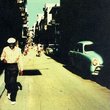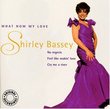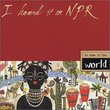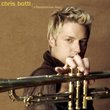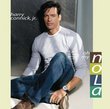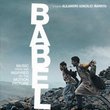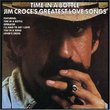| All Artists: Compay Segundo Title: Calsalud Members Wishing: 0 Total Copies: 0 Label: Warner Spec. Mkt. UK Release Date: 5/27/1999 Album Type: Import Genres: International Music, Jazz, Latin Music Styles: Caribbean & Cuba, Cuba, Latin Jazz Number of Discs: 1 SwapaCD Credits: 1 UPC: 639842758321 |
Search - Compay Segundo :: Calsalud
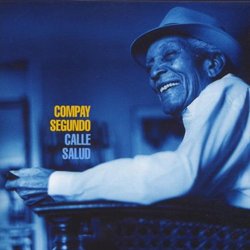 | Compay Segundo Calsalud Genres: International Music, Jazz, Latin Music
CD > POPULAR MUSIC > LATIN |
Larger Image |
CD DetailsSynopsis
Product Description CD > POPULAR MUSIC > LATIN Similar CDs
Similarly Requested CDs
|
CD ReviewsAged Wine Still The Best Meathook Williams | Warwick, Massachusetts | 08/10/2001 (5 out of 5 stars) "When Compay Segundo was born, Roosevelt was in the White House... Teddy, not Franklin. At 92, he's certainly the oldest member of the musical phenomenon Buena Vista Social Club, and the first alumnus to put out a second album since the club came to it's recent popularity. Having fiddled around a bit too long with the an attempted review of his last album, I was taken by suprise with this release following so closely at it's heels. I'm not about to let this happen again. "Calle Salud" is even better than the last, with a bit more diversity and polish. This is the music of 1920s and 1930's Cuba, exactly as it sounded then, but with the pristine sound quality that only modern technology can deliver. Here in the States, the twenties may have been roaring, but in Cuba, music was far more profound and unfeigned, with a tremendously sophisticated eloquence that was simply lacking it's northern counterpart (except, perhaps, with rural blues, which was, in any event, less urbane). And no Cuban music fit this description more than the son and rumba stylings heard here. With only a paucity of instrumentation, it is the antithesis of the Cuban big band sound popularized only a bit later by such artists as Benny More and later still, by Desi Arnaz and all the others. This vital music is as lovely and refined as has ever been produced, and has scarcely changed since those times. Compay has stiff competition within the Buena Vista Social Club which also claims such voices as Ibrahim Ferrer and Eliades Ochoa (both reviewed a few months ago right here), but it's his voice that is my personal favorite. It's deep, resonant qualities are as rich as chocolate cheesecake, with those subtle nuances that can only be achieved by time itself. The laid-back arrangements of these traditional songs provide a rich palette of colors from which Compay paints his masterpieces. The songs speak of everyday life in Cuba, songs of love, work and contemplation. The harmonies are simple but precise and sound effortless. Likewise, all of the ensemble playing strives for the substantive and not the flashy. This is the sound of pure emotion. It's so fortunate, therefore, that Compay is still with us and able to benefit from modern recording techniques and equipment. This disc makes it sound as if he's right in your living room, singing only to you. The other obvious blessing is that, finally, he's getting the recognition he so deserves and the monetary rewards which accompanys it. And there's more oil in the pipeline, with several upcoming projects on the burner as we speak. These might be the gloaming years of his career, but nightfall hasn't arrived quite yet. The man is still touring! He recently played the area with a band that includes several sons. He's trying for a sixth child as we speak, and claims he has no use whatsoever for viagra. Stranger things have certainly taken place, and, even after 87 years (his claim) of smoking cigars, I'm inclined to believe he'll suceed at it. A faultless, stunning recording by the dominant lion of traditional Cuban music, "Calle Salud" is hopefully not Segundo's swan song. He's an international treasure, and shows no signs of giving up the ghost any time soon. Viva!" Great album of classic Latin songs, but... Manny Hernandez | Bay Area, CA | 10/28/2003 (4 out of 5 stars) "This is without a doubt a great album made up of classic Latin songs (not just from Cuba, since you also find tunes like Gardel's "El Dia que me Quieras"). However, I have a problem with it: I don't enjoy the fact that it's been put out as a Compay Segundo album, when in most of the songs, due to his age, it's not even his voice that stands out (or is listed as Lead Vocals at all, for the matter, Hugo Garzon appears as such in most of the tracks).As a son of a Cuban-born music-loving woman, I was raised listening on and off to some of these tunes, so I love them, but I hate the feeling of exploitation that this album exhudes. Unlike other Buena Vista-related releases, such as Ibrahim Ferrer's or Ruben Gonzalez, where they still perform beyond any doubt, Cuban musical legend Compay Segundo should have been receiving tributes by the time this album came out, not made pose for an album where he could barely be noticed. Now, like Celia Cruz, he's no longer with us, so this is almost like a post-mortem rant... My two cents." Liked "Lo Mejor De La Vida" much better BVSC fanatic | United States | 06/09/2001 (3 out of 5 stars) "Okay, I'm obviously in the minority here. At least so far. But this CD leaves me just a bit cool -- a question of personal preference, no doubt. It's not bad. Far, far from that. It has several good tracks. But it doesn't knock my socks off. I have Compay's "Lo Mejor De La Vida" CD, which I just love and did from the very first playing. The "Buena Vista Social Club" and "De Cuba Son" CDs had the same effect on me. I loved them right away, and have never tired of them. I've decided that it's the clarinets. They get a bit intrusive and annoying (to me, anyway) on several cuts. They're almost (though not quite) as annoying as Ry Cooder's slide guitar on so many of the Buena Vista Social Club recordings. Maybe it's just me, but the clarinets keep me thinking that this CD should be called "Tres Player On The Roof". And then I keep flashing back to the BVSC video -- the scene art where Compay Segundo is trying to locate the site of the old Buena Vista Social Club. Compay was giving another elderly gent his recipe for avoiding hangovers and maintaining overall health --- it's your basic chicken soup. So maybe "Tres Player On The Roof" isn't so far off afterall. But what do I know? Hey, maybe the CD will grow on me with time. But it doesn't pack that right-out-of-the-package punch that "Lo Mejor De La Vida" had for me."
|

 Track Listings (13) - Disc #1
Track Listings (13) - Disc #1